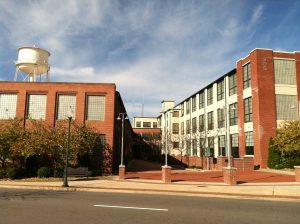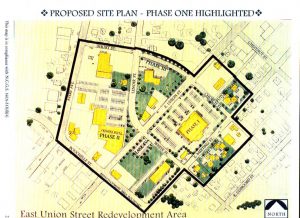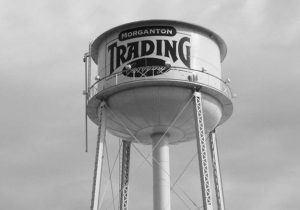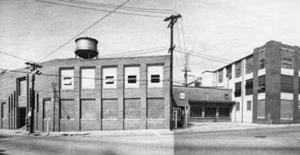|
|
Redevelopment of Historic Mill Properties – The Morganton Trading CompanyBy CED Guest AuthorPublished May 3, 2012
Leaders in Morganton, NC have undertaken several transformative redevelopment projects involving complex financing with a mix of public and private funds. One of Morganton’s signature projects is the Morganton Trading Company, an adaptive mill reuse project in downtown. This short case study will summarize the redevelopment of the Morganton Trading Company. Morganton Trading Company (redevelopment, 1996-2006) by Vincent Monaco, graduate student in the UNC Department of City and Regional Planning and Kenan-Flagler Business School The Morganton Redevelopment Commission was formed in 1995 to focus resources on the “East Union Street Redevelopment Area,” a section of town that had experienced significant decline. The redevelopment area encompassed several deteriorating buildings, including a fully operational 160,000 sq foot textile mill belonging to the Premiere Manufacturing Knitting Company. Originally constructed in 1882, the mill was refurbished in 1917, and then expanded in 1929. When Premiere declared bankruptcy in 1996, the Commission declared the redevelopment of this 114-year-old building its top priority. The city acquired the mill from the bankruptcy court for $250,000, and then initiated a public process to determine the highest and best future use for the property. The city then put out a Request of Proposals (RFP) to attract a private development partner. In 1999, the city selected an architect from Charlotte to redevelop the mill. The developer’s proposal included a two-phase public-private partnership. Phase I, with an approximate cost of $4.3 million, involved moving City Hall into the redeveloped mill. With the City as an anchor tenant, the project was able to attract debt financing from Bank of America. Project financing also included $2 million in federal and state historic tax credits, as well as CDBG Entitlement and Powell Bill Funds. In addition to constructing a new 33,650 sq foot City Hall (Phase I), the restored mill would contain 43 residential units and some additional commercial and retail space (Phase II).
The redevelopment of the Morganton Trading Company was completed in approximately 2006, when the residential component of the property began to lease up, and currently (as of 2012) it is operating at 100% occupancy. In addition to the mill reuse, the East Union Street Redevelopment Area has seen the renovation of an historic church and several new developments including: a BB&T Branch, a condominium project, a restaurant, a CVS Pharmacy, and a movie theatre. According to a report from Preservation North Carolina, over $35 million in new investment has taken place since 2001 a as a result of this project.
|
Published May 3, 2012 By CED Guest Author
 The Development Finance Initiative (DFI) at the School of Government partners with local governments in North Carolina to attract private investment for transformative projects by providing specialized finance and development expertise. The DFI team at the School of Government is developing a series of case studies to illustrate ways in which public-private partnerships and are being used to redevelop downtown properties across North Carolina.
The Development Finance Initiative (DFI) at the School of Government partners with local governments in North Carolina to attract private investment for transformative projects by providing specialized finance and development expertise. The DFI team at the School of Government is developing a series of case studies to illustrate ways in which public-private partnerships and are being used to redevelop downtown properties across North Carolina.
Leaders in Morganton, NC have undertaken several transformative redevelopment projects involving complex financing with a mix of public and private funds. One of Morganton’s signature projects is the Morganton Trading Company, an adaptive mill reuse project in downtown. This short case study will summarize the redevelopment of the Morganton Trading Company.
Morganton Trading Company (redevelopment, 1996-2006)
by Vincent Monaco, graduate student in the UNC Department of City and Regional Planning and Kenan-Flagler Business School
The Morganton Redevelopment Commission was formed in 1995 to focus resources on the “East Union Street Redevelopment Area,” a section of town that had experienced significant decline. The redevelopment area encompassed several deteriorating buildings, including a fully operational 160,000 sq foot textile mill belonging to the Premiere Manufacturing Knitting Company. Originally constructed in 1882, the mill was refurbished in 1917, and then expanded in 1929. When Premiere declared bankruptcy in 1996, the Commission declared the redevelopment of this 114-year-old building its top priority. The city acquired the mill from the bankruptcy court for $250,000, and then initiated a public process to determine the highest and best future use for the property. The city then put out a Request of Proposals (RFP) to attract a private development partner.
In 1999, the city selected an architect from Charlotte to redevelop the mill. The developer’s proposal included a two-phase public-private partnership. Phase I, with an approximate cost of $4.3 million, involved moving City Hall into the redeveloped mill. With the City as an anchor tenant, the project was able to attract debt financing from Bank of America. Project financing also included $2 million in federal and state historic tax credits, as well as CDBG Entitlement and Powell Bill Funds. In addition to constructing a new 33,650 sq foot City Hall (Phase I), the restored mill would contain 43 residential units and some additional commercial and retail space (Phase II).
 The project faced a number of challenges during the redevelopment process. These included the tax credit investor withdrawing from the deal and the deterioration of the developer’s health, which delayed progress for an extended period of time. Phase I (City Hall) was completed in 2001. Phase II was delayed until 2005, at which point a new developer, lender, and equity investor had to be brought in to complete the construction. The total project cost at the conclusion of Phase II was approximately $11.8 million.
The project faced a number of challenges during the redevelopment process. These included the tax credit investor withdrawing from the deal and the deterioration of the developer’s health, which delayed progress for an extended period of time. Phase I (City Hall) was completed in 2001. Phase II was delayed until 2005, at which point a new developer, lender, and equity investor had to be brought in to complete the construction. The total project cost at the conclusion of Phase II was approximately $11.8 million.
The redevelopment of the Morganton Trading Company was completed in approximately 2006, when the residential component of the property began to lease up, and currently (as of 2012) it is operating at 100% occupancy. In addition to the mill reuse, the East Union Street Redevelopment Area has seen the renovation of an historic church and several new developments including: a BB&T Branch, a condominium project, a restaurant, a CVS Pharmacy, and a movie theatre. According to a report from Preservation North Carolina, over $35 million in new investment has taken place since 2001 a as a result of this project.
 The Morganton Trading Company is an example of a project in which the public and private sector interests were aligned to accomplish major downtown redevelopment goals.
The Morganton Trading Company is an example of a project in which the public and private sector interests were aligned to accomplish major downtown redevelopment goals.
Author(s)
Tagged Under
This blog post is published and posted online by the School of Government to address issues of interest to government officials. This blog post is for educational and informational Copyright ©️ 2009 to present School of Government at the University of North Carolina. All rights reserved. use and may be used for those purposes without permission by providing acknowledgment of its source. Use of this blog post for commercial purposes is prohibited. To browse a complete catalog of School of Government publications, please visit the School’s website at www.sog.unc.edu or contact the Bookstore, School of Government, CB# 3330 Knapp-Sanders Building, UNC Chapel Hill, Chapel Hill, NC 27599-3330; e-mail sales@sog.unc.edu; telephone 919.966.4119; or fax 919.962.2707.


